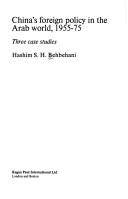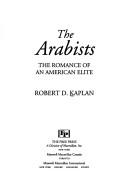| Listing 1 - 10 of 39 | << page >> |
Sort by
|
Book
ISBN: 0813308755 Year: 1991 Publisher: Boulder Westview Press
Abstract | Keywords | Export | Availability | Bookmark
 Loading...
Loading...Choose an application
- Reference Manager
- EndNote
- RefWorks (Direct export to RefWorks)
Arab countries --- Foreign relations --- Arab countries - Foreign relations.
Book

ISBN: 9780815722267 Year: 2011 Publisher: Washington (D.C.) Brookings Institution Press
Abstract | Keywords | Export | Availability | Bookmark
 Loading...
Loading...Choose an application
- Reference Manager
- EndNote
- RefWorks (Direct export to RefWorks)
Book
ISBN: 9789774161971 9774161971 Year: 2009 Publisher: Cairo: American university in Cairo press,
Abstract | Keywords | Export | Availability | Bookmark
 Loading...
Loading...Choose an application
- Reference Manager
- EndNote
- RefWorks (Direct export to RefWorks)
International relations --- Arab countries - Foreign relations --- Arab countries
Book
ISBN: 0333579240 Year: 1993 Publisher: Houndmills Basingstoke London Macmillan Press
Abstract | Keywords | Export | Availability | Bookmark
 Loading...
Loading...Choose an application
- Reference Manager
- EndNote
- RefWorks (Direct export to RefWorks)
Book
ISBN: 9780863564468 0863564461 Year: 2011 Publisher: London: Saqi,
Abstract | Keywords | Export | Availability | Bookmark
 Loading...
Loading...Choose an application
- Reference Manager
- EndNote
- RefWorks (Direct export to RefWorks)
The Arab world's strategic location and its considerable material and human potential should allow it to play a major role in world affairs. However, plagued by authoritarian regimes, ethnic and social cleavages, economic underdevelopment and military weakness, these states depend on the outside for security. In this balanced and discerning study, Hassan Hamdan al-Alkim examines the dynamics of Arab foreign-policy-making in the twenty-first century. He considers the significance of a changing world order, an unstable Arab regional order, and the Arab-Israeli conflict for Arab foreign policy-making processes. The book's four case studies - the Middle East Peace process, the Water crisis, the Food crisis, and Saudi Arabia's foreign policy - enable a wide-ranging analysis for understanding contemporary Arab politics and its role in world affairs.

ISBN: 0710300085 9780710300089 Year: 1981 Publisher: London: Kegan Paul,
Abstract | Keywords | Export | Availability | Bookmark
 Loading...
Loading...Choose an application
- Reference Manager
- EndNote
- RefWorks (Direct export to RefWorks)

ISBN: 002916785X Year: 1993 Publisher: New York : Free Press,
Abstract | Keywords | Export | Availability | Bookmark
 Loading...
Loading...Choose an application
- Reference Manager
- EndNote
- RefWorks (Direct export to RefWorks)
Book
Year: 2016 Publisher: Rome : NATO Defense College Foundation,
Abstract | Keywords | Export | Availability | Bookmark
 Loading...
Loading...Choose an application
- Reference Manager
- EndNote
- RefWorks (Direct export to RefWorks)
Traditionally the Middle East is considered a region so complex that it does not allow a clear political narrative on its political and strategic priorities : it is an explication but also an excuse for short sighted crisis management and inaction. This conference, where the NATO Defense College Foundation has brought together an exceptional array of regional practitioners in a very critical period of the region, has dispelled this and other myths. Firstly it has demonstrated that cooperation is possible in such a diverse and fragmented environment because the different cultures and components of the area have never ceased to reflect in a very critical way about the past and the present. Political short-term interests can be divergent, but there is a common understanding that has been accelerated by the jolt of the Arab Revolutions : change is necessary, inevitable and even manageable despite serious obstacles. Secondly, cultural distinctions, often portrayed as unsurmountable and unintelligible religious gaps, have once more being revealed as very concrete power and political differences. As often since a century, war, in its different and changing facets, has been deemed as the great problem-solver, and yet the conference proceedings show that there is a strong opportunity and advantage in pursuing negotiated solutions. Thirdly, all participants sensed that the age of the great, all-encompassing and almost never-ending interventions is over. All actors understand that the best contribution to regional stability is supporting endogenous and consensual change in a sensible way. NATO's cooperative security can offer useful tools in a meaningful way to the entire region.
Book
ISBN: 9780367227524 9780429276712 0429276710 9781000020274 1000020274 9781000020595 1000020592 9781000020434 1000020436 Year: 2019 Publisher: Milton Park, Abingdon, Oxon ;New York, NY Routledge
Abstract | Keywords | Export | Availability | Bookmark
 Loading...
Loading...Choose an application
- Reference Manager
- EndNote
- RefWorks (Direct export to RefWorks)
This book looks at the way primarily external actors influenced and were influenced by the revolutionary chaos that erupted in the Arab Middle East in 2011. The Arab revolutions radically altered the Middle East dynamic and particularly the strategic standing of key actors, both locally and globally. The 'winners' are leaders with strategic understanding of the region and a scheme for exploiting the chaos - Putin, Netanyahu and Iran's Qasem Soleimani-along with, strikingly, the very institution of Arab monarchy. The 'losers' are the Arab autocrats who were deposed in Egypt, Libya and Yemen. The Palestinians, seemingly bypassed by the dynamic of Arab revolution, are also losers. So are the American presidents - Bush and Obama - whose disastrous strategic decision-making catalyzed Arab state fragmentation and opened the gates of the Levant to Iran's drive for regional hegemony. Western democratic society suffered too - from waves of Islamist terrorism and the effects of Muslim migration generated at least in part by Arab chaos. Only in the case of two leaders was the jury still out by 2019. Saudi Arabia's brutal reformist crown prince, Mohamed bin Salman, put Saudi women in the driver's seat but butchered and abused political rivals and neighbors alike. And US President Trump's demand to get America out of the Middle East would actually make some sense in this chaotic context if it were embedded in a cohesive strategy. This book takes a global look at a massive regional upheaval that is far from over. It is an essential read for everybody interested in the Arab revolutions, Middle East and international strategic affairs.
Book
ISBN: 9781597976732 Year: 2011 Publisher: Washington : Potomac Books,
Abstract | Keywords | Export | Availability | Bookmark
 Loading...
Loading...Choose an application
- Reference Manager
- EndNote
- RefWorks (Direct export to RefWorks)
| Listing 1 - 10 of 39 | << page >> |
Sort by
|

 Search
Search Feedback
Feedback About UniCat
About UniCat  Help
Help News
News